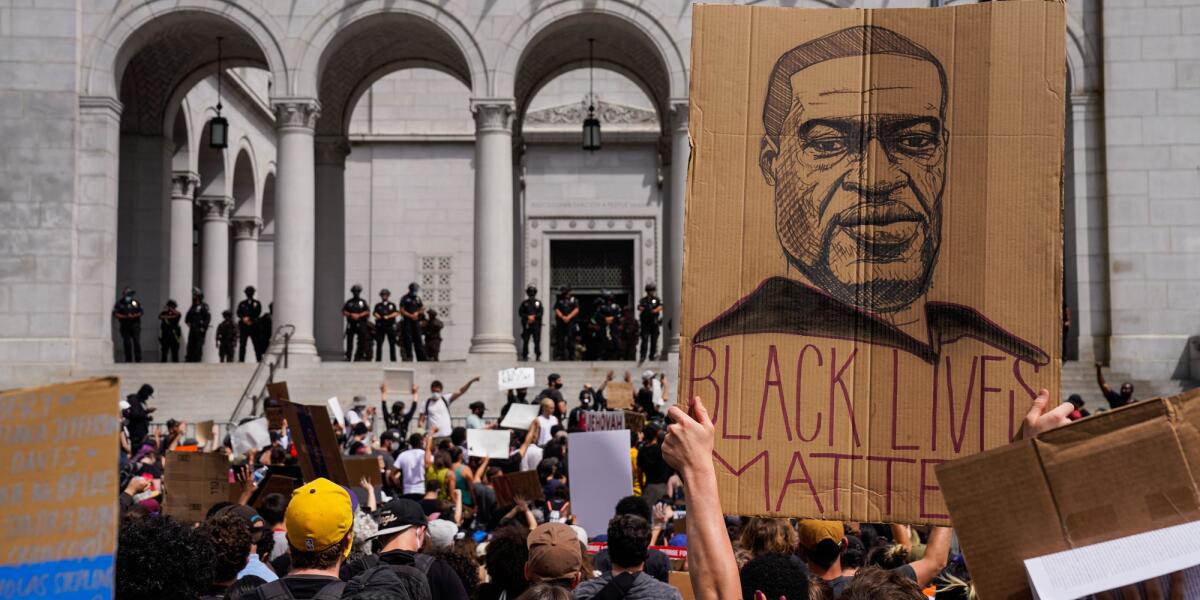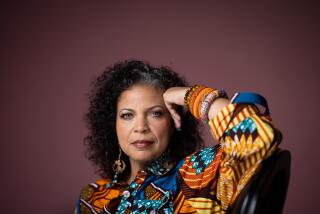Opinion: L.A. is broken. The ‘People’s Budget’ would finally do something to fix it

- Share via
It can feel naive to hope.
Los Angeles is a city where policing has long been violent, secretive and anti-Black. In the past 20 years, local police have killed nearly 900 civilians, almost 80% of whom were Black or Latino. In that same time period, only two officers were charged. The Los Angeles Police Commission, which oversees the Los Angeles Police Department, is inept, detached and financially compromised.
But as Angela Y. Davis wrote in “Freedom Is a Constant Struggle,” when people join together in a cause, “we find reservoirs of hope and optimism.” And the group of Angelenos that has assembled to demand an end to anti-Black policing and policy has never been more diverse, driven or organized than it is at this moment. Los Angeles needs a city budget that reflects the priorities of our people, not its influential police union — and, this year, we might just get one.
On Monday, in a special City Council session, organizers from Black Lives Matter-LA, BUILD POWER, and L.A. Voice made a concise and powerful argument for a “People’s Budget,” which would divest from policing and invest in community services. On Tuesday, council members Herb Wesson, Nury Martinez, Marqueece Harris-Dawson, Curren Price and Bob Blumenfeld introduced a motion to “replace LAPD officers with unarmed, non-law enforcement agencies who will be responsible for responding to non-violent calls for service.” On Wednesday, Price introduced a motion that would make it illegal to call 911 to make a false report based on racial bias. Other related motions will be forthcoming.
This isn’t a moment to declare victory, but it is a moment to celebrate.
How did BLM-LA achieve this momentum, after years of being sidelined, silenced and overlooked by city representatives?
George Floyd’s murder is no opportunity; it is a grievous tragedy, for his family, for his community and for our country. There is opportunity in the widespread outrage Floyd’s death has ignited, however. Across the United States, we have seen renewed calls for an end to anti-Black racism and for the rights of Black Americans to live freely in a country that has long cited political and social freedoms as the source of its exceptionalism, while denying those freedoms to the many marginalized communities that built and sustain it.
The COVID-19 pandemic is no opportunity; it is a nightmare, which has killed more than 115,000 Americans and disproportionately impacted Black Americans. At the time of this writing, Los Angeles County had the second-highest number of confirmed COVID-19 cases of any county in the United States. Black Angelenos are dying from COVID-19 at more than twice the rate of white Angelenos.
Yet there is opportunity in the spotlight COVID-19 has shone on our society’s brokenness. The pandemic has laid bare the incompetence of many governmental leaders at the national, state and local level. It has underscored the degree to which Black Angelenos receive inadequate healthcare support and, as a result, suffer compromised health outcomes. It has provided Angelenos, many of whom are either out of work or working from home, time to engage with and organize around their local political processes.
Los Angeles’ council and city commissions have long erected barriers to widespread public participation, not least of which is the fact that many of their meetings are held during the workday in venues with limited space. Prior to COVID-19, those wishing to offer public comment could either submit it in writing or show up in person. Now, as city officials are meeting remotely, Angelenos can call in via Zoom or phone to offer public comment. These Zoom meetings, which cap at 500 participants, have often filled before they even begin, leading organizers to find other ways — from live-tweeting to livestreaming or alternate video hosting — to share what is happening.
Los Angeles has long been viewed as a municipally disengaged city — its citizenship largely progressive, but siloed, spread out and disconnected from local political processes. But even before George Floyd was killed by police, even before COVID-19 rendered our city unrecognizable, new forms of civic participation had been brewing.
Most crucially, BLM-LA has been tirelessly organizing since 2013, after George Zimmerman was acquitted in the murder of Trayvon Martin. In the past three years, organizers have founded other grass-roots support networks like Ktown for All, Ground Game L.A., People’s City Council L.A. and many others. The swell of volunteer support and organizing around Nithya Raman‘s City Council campaign has been remarkable.
Longtime organizers say the current level of civic participation and engagement is unprecedented. Akili, a BLM-LA organizer who goes by a single name, has been involved in justice work for nearly 50 years. “I’ve organized with Cesar Chavez and the farmworkers; I organized during the anti-apartheid movement; I’ve done political, labor and community organizing for a long time,” he told me. “I know that the people who start out with you in June are not the people who are reachable in October. But for me, this [moment] has a different ring to it.”
BLM-LA has been doing the work that made this moment possible. It organized an 18-day encampment of LAPD and a 54-day encampment of L.A. City Hall. It advocated for the firing of former LAPD Chief Charlie Beck. (Beck took early retirement.) BLM-LA was part of the coalitions that led on a ballot measure to increase civilian oversight of the L.A. County Sheriff’s Department and a landmark police transparency bill. It has supported Black Angeleno families who were killed by police and organized cross-country freedom rides. BLM-LA co-founder Melina Abdullah has been leading weekly protests against L.A. Dist. Atty. Jackie Lacey’s leadership for nearly three years.
On April 16, a BLM-LA-led coalition of more than 50 Black L.A. community groups released a set of immediate and long-term demands identifying COVID-19 as “a Black issue that demands a response specific to the needs of the Black community.”
That coalition did not receive meaningful support from the City Council.
When Mayor Eric Garcetti released a proposed city budget on April 20 that would increase spending on the LAPD, that BLM-LA-led coalition expanded its outreach, connecting with more than a dozen community organizations, from La Defensa to the Labor Community Strategy Center. Together, they created the People’s Budget L.A., a compelling and clear proposal for a city budget that would divest from policing and invest in community support. By the time Floyd was killed by police on May 25, the People’s Budget L.A. site — replete with data, tool kits and shareable infographics — was live and its BLM-led coalition was solid. Angelenos, many of whom had never engaged in local politics, started looking for ways to connect — and found the People’s Budget.
At the hundreds of police brutality protests in Los Angeles over the last few weeks, organizers have highlighted the People’s Budget and circulated information on the proposal. The pressure for real action from the mayor and City Council members is building. “The country has been here before. It was here when Emmett Till died. It was here then,” Akili said toward the end of Monday’s special session. “And so now we are here at this moment. You have said your positions and they line up. The question now is what will you do?”
BLM-LA organizers have repeatedly modeled what it would look like for Angelenos to live the progressive values we purport to hold. It’s time for our mayor and council members to do the same.
It’s been time.
More to Read
A cure for the common opinion
Get thought-provoking perspectives with our weekly newsletter.
You may occasionally receive promotional content from the Los Angeles Times.











